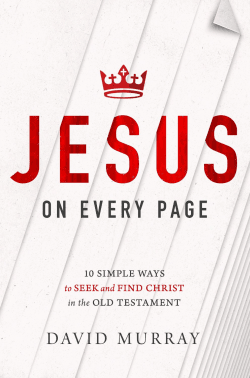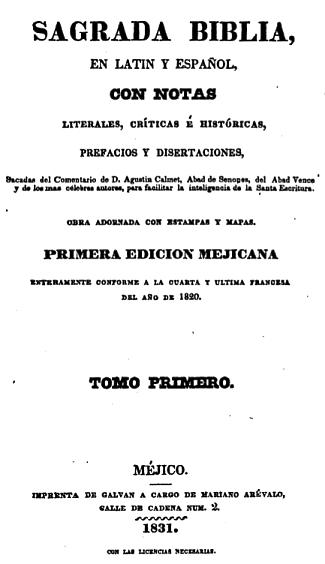Jesus on Every Page (book review)
And he said to them, “O foolish ones, and slow of heart to believe all that the prophets have spoken! Was it not necessary that the Christ should suffer these things and enter into his glory?” And beginning with Moses and all the Prophets, he interpreted to them in all the Scriptures the things concerning himself.
Luke 24:25-27
This month I was graciously given a copy of the new book Jesus on Every Page to review, from the author and the publisher (Thomas Nelson).
 |
Since the book focuses on the study of Jesus in the Old Testament, I jumped at the chance. You might remember a while back that I wrote a post with the presumptuous title, How to Study the Old Testament. I believe that Jesus’ words, quoted above, should be taken seriously. But how we actually go about finding Jesus in the Old Testament – well, it’s been a matter of a lot of debate.
I’ll start by saying – I liked the book. I think it’s very useful and helpful. But…
The author, David Murray, writes the book partly as an autobiography – the story of his struggle to understand the place of the Old Testament. It’s not a theological technical manual, or a list of to-dos that you need to check off in your Bible study. Instead, Dr. Murray shares his own journey of discovery.
It made the book interesting, but it also demonstrated something – Murray comes from a whole different world. He comes from Scotland. He now lives in the United States. And he comes from a Baptist and then Presbyterian background (Free Church of Scotland/Free Church of Scotland (Continuing)). He’s now a professor at a theological seminary.
And I’m not any of those things. Ok, so I’m part Scottish.
When he was a young believer, he noticed that preachers rarely if every opened up the Old Testament, and some of his Christian friends seemed to outright reject it.
I admit, I was much more surprised to hear these things than I was to hear about the ways we can see Jesus in the Old Testament. As a young believer, I regularly heard about the Old Testament, and was taught to see God’s Son there.
And so perhaps the greatest challenges in reading this book was that Murray comes from a drastically different perspective.
But let me briefly explain what the book is about, then I’ll give some final thoughts.
What’s the book about?
Through the story of his own journey, Murray goes through the teaching of the Scripture itself to help us understand the relationship between the New Testament, the Old Testament, and today’s believer.
For example,
- Did Old Testament believers really understand that a Messiah was coming? If so, what did they know about him?
- Doesn’t Paul say that we’re no longer under the “law”? Doesn’t this put the law in a negative light, as opposed to “grace”?
- Isn’t the OT all about “works”? And Jesus is all about “grace”, right?
After looking at Biblical answers to these questions, Murray goes through various parts of the Old Testament, showing how Jesus shines through bright and clear. Jesus in Creation, Jesus in the Law, Jesus in OT characters, Jesus in Proverbs, and so on.
As he goes through, he also tries to answer some important questions that many of us have.
For example, maybe you’ve heard a preacher who seems to compare some person or some story with Jesus – and it seems like they’re taking things totally out of context. “The Ark was made of wood – and so was the Cross!” That sounds lovely, but most people realize that the Bible talks about containers, carts, and even idols made of wood. Surely these aren’t all symbols of the cross!
We don’t want to make things up out of our imaginations – “silly myths” (1Timothy 4:7). We’ve seen people who can make the Bible say whatever they want. We want to know – what does it actually say?
Murray deals with these issues carefully, and helps us think through these things for ourselves.
Downsides to the book?
Any downsides to the book? I was at a bit of a disadvantage reading from a pdf version of the book. That meant that I didn’t have easy access to the footnotes – usually Scripture references. In a print book, and also in the Kindle version (which links the footnotes), you won’t have this problem.
But it would have been a help if I could have easily looked up the “further proofs” to what he was saying.
Of course, to talk about Jesus in all the Old Testament in a book this size was a challenge. There was no time to back up and explain every point.
Although I found I could agree with most of what Murray said, I would love to further discuss a number of points I disagreed with or wasn’t sure of. But if we don’t have time to discuss them in this life, I’m sure we can carry on in eternity!
The book’s strengths
If these things are weaknesses of the book, maybe they’re strengths too. The book is not a commentary on the OT. It’s a “teaser”.
It explains why we should be looking for Jesus in the OT. And it helps us to think for ourselves as we do it. It’s simply a basic map to aid us on our own journey of discovery.
If you’re a Christian, you’ll find this book helpful. It will bring new excitement and joy to your devotional time.
If you’re a pastor, missionary, Bible teacher – it will also be useful. There are so many valuable nuggets throughout the book that everyone will learn something. And maybe you’ll learn to help others avoid some of the early experiences that David Murray has!
In fact, if you’ve ever struggled with how Jesus fits with the Hebrew Scriptures, this book is a great place to start finding answers.
This book truly comes from years of experience – spending time with people, studying, pastoring, teaching – and the result is a gift to the Church. Whatever denomination you’re in, whatever background you’re from, you’ll learn all over again how to see the glorious and beautiful Saviour – on every page.
The book is available at amazon here: Jesus on Every Page. You can visit the official Jesus on Every Page website here.
By the way – if you buy this book before the 31st of August, you’ll also get $100 worth of Old Testament resources! It doesn’t matter if you buy it as a bookstore or on amazon or wherever. You’ll get intros to all the OT books, a video series, a mini-novel, digital posters, and more!
Plus, if you buy it through the amazon link above, a portion will support our ministry in Mexico.


